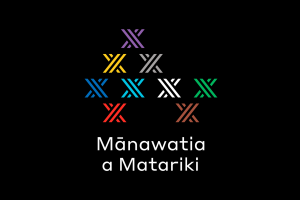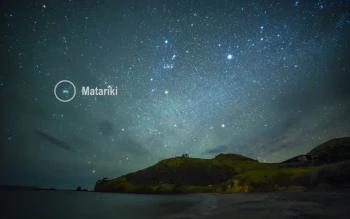
Time of remembrance, reflection, and renewal
Nau mai i ngā hua, nau mai i ngā taonga, nau mai i te mātahi o te tau! 
Welcome the fruits of the year, welcome the many treasures, welcome the New Year!
Whāia te mātauranga, ka tītiro whakamuri ki ngā huarahi whakamua.” – Seek knowledge from the past, and look forward to the paths ahead.
On Friday June 28 people from all walks of life are invited to engage in a rich tapestry of traditions, festivities, and reflections that embody the spirit of Matariki.
As the stars of the Matariki cluster rise in the winter sky, they signal a time of remembrance, reflection, and renewal across Aotearoa. A time to honour ancestors, acknowledge achievements, and plan for the future.
A time to connect, reflect on promoting happiness, health, and wellbeing, celebrate and share kai!
And driving the celebrations across the motu is this year’s theme which is ‘Matariki Heri Kai – The feast of Matariki’.
 Chief Advisor Mātauranga Matariki, Professor Rangi Mātāmu explains that Matariki Heri Kai comes from the Māori proverb ‘Matariki whetū heri kai’ meaning ‘Matariki, the bringer of food’.
Chief Advisor Mātauranga Matariki, Professor Rangi Mātāmu explains that Matariki Heri Kai comes from the Māori proverb ‘Matariki whetū heri kai’ meaning ‘Matariki, the bringer of food’.
‘Matariki Heri Kai is a proverb that speaks to the association between the appearance of Matariki and the bounty of the impending season.
‘Building on last year’s theme ‘Matariki kāinga hokia’ we encourage people to view Matariki as a time to journey home, spend time with whānau and friends, and enjoy feasting on fresh, locally sourced produce,’ he adds.
Tumu Whakarae Secretary for Culture and Heritage, Leauanae Laulu Mac Leauanae, says Matariki is all about bringing people together, and this year’s theme is helping guide celebrations across the country.
‘Matariki is for all people in Aotearoa New Zealand, and a wonderful time to connect come together to reflect, celebrate and share kai,’ he says.
The different stars in the Matariki cluster have an association to the various domains from where we source our food, in particular: gardens (Tupuānuku), forests (Tupuārangi), fresh water (Waitī) and ocean (Waitā). This connection encourages us to consider our role in protecting and caring for these ecosystems.
Research from last year, says Leauanae Laulu Mac Leauanae proves that Matariki is inclusive and for everyone to take part in. More than two thirds (68%) of New Zealanders thought that Matariki brings people and communities together.
‘Whether the food is from our farms, our oceans or our gardens, I encourage you to experience Matariki with kai. Reach out to your community, your whānau, and your friends to share kai, however you wish to come together.’ 
Chris Webber (Āti Awa, Ngāti Raukawa, Ngāti Toarangatira, a member of the HPF Māori advisory group and Massey University senior lecturer in Māori health) says 'gather, remember, share and plan' are principles inspired by Matariki that can be applied in our thinking as a public health whanau.
‘As your team does an annual 'reset', the spirit of collective energy, gratitude and connectedness can lift the fruits of our planning to new heights.’
Six in 10 New Zealanders celebrated Matariki last year, and while the ways of celebrating varied, getting together with friends and whānau for kai and going outside to view the Matariki star cluster were the most popular activities.
The Matariki public holiday also encouraged various activities over the long weekend for 64% of New Zealanders, from spending time with friends and whānau, going out for a meal or drink, attending an event, festival, or concert (Matariki and non-Matariki specific), to shopping, day trips, and getting away for the long weekend.
New Zealanders' engagement with Matariki report 2023
This research report provides a robust and representative understanding of the nation’s attitudes, perceptions, and engagement with Matariki, the Māori New Year and the public holiday. Many of the questions in the survey were built on the prior Cultural Participation in 2022 Research, commissioned by Manatū Taonga.